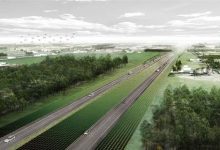The national water management agency of the Netherlands is moving forward with plans to build a large-scale solar power plant along the 40 kilometre-length of the country’s A37 Highway.
The Netherlands water management agency, Rijkswaterstaat, announced a series of four information evenings with communities along the route of the A37 motorway in the province of Drenthe.
The information evenings are intended to garner community input and answer questions, as well as provide a visual presentation of the what the potential solar route could look like – designed by architectural firm Studio Marco Vermeulen.
Set to be developed along the 40 kilometre length of the A37, the solar project – which could boast as much as 140MW – is being developed by province of Drenthe, the municipalities of Coevorden, Emmen, Hoogeveen, network company Enexis Groep, network operator Rendo, and Rijkswaterstaat.
If approved, the project would see solar PV modules installed along either side and down the median strip of the two-lane highway, spanning approximately 300 hectares in total.
The project is part of a larger plan being carried out by Rijkswaterstaat, the Central Government Real Estate Agency and the Netherlands Enterprise Agency, on behalf of the Ministry of Economic Affairs and Climate, investigating how national land can be used to develop renewable energy projects.
Currently, according to information from Rijksoverheid, the Government of the Netherlands (PDF), three projects are currently being considered, including another solar route along the A58/A16 in the country’s south, and a 100 MW combined onshore/offshore solar and wind hybrid project in the country’s south-west.
Netherlands’ Government explains that “The aim of the program is to develop an approach with which energy projects on national lands at a cost can be realized effectively and smoothly with an eye for quality for the environment and for society support base.”
The current plans are an attempt to further the use of the country’s roads for renewable energy generation, building on pilot projects which have resulted in the construction of noise barriers with integrated bifacial solar modules along several highways across the country.
The first such project, built along a 400-metre stretch of the A50 in the centre of the country, was finalized in early 2019.
The Rijkswaterstaat used the installation to study the feasibility of installing more such projects, and has since secured €1.4 million from the European Commission to accelerate the use of such solar PV technology on noise barriers along Europe’s main roads in a project run in collaboration with the Energy Research Centre of the Netherlands, and the Solar Energy Application Community.










